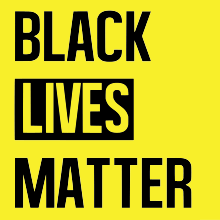No justice, no peace
"No justice, no peace" is a political slogan that originated in protest of ethnic violence against African Americans by White Americans, though its precise meaning is contested. The slogan has been used as early as 1986, following the murder of Michael Griffith at the hands of mob of white youths.
| Meaning | contested but either:
|
|---|---|
| Context | Murder of Michael Griffith |
.jpg)
History
.jpg)
Linguist Ben Zimmer writes that use of the slogan "No justice, no peace" during protests goes back as far as the 1986 murder of Michael Griffith.[1] Griffith, a Trinidadian immigrant, and three friends, all black, were assaulted by a mob of white youth in the Howard Beach, Queens, New York City. Griffith fled the attackers onto a nearby highway, where he was fatally struck by a passing car.[2] In 2014, civil-rights activist Al Sharpton recounted: "In the midst of the protest, someone yelled the slogan, 'No justice, no peace'. Others began doing the same, and from then on I adopted it as a rallying cry each and every time a grave miscarriage of justice has befallen the disenfranchised."[3]
Other sources suggest that the phrase was actually popularized by activist Robert "Sonny" Carson, who is quoted on February 12, 1987 as stating, "'No justice! No peace!' Carson shouted. 'No peace for all of you who dare kill our children if they come into your neighborhood...We are going to make one long, hot summer out here...get ready for a new black in this city!," while the New York Times reported on July 6, 1987: "'No justice, no peace,' said Mr. Carson repeatedly in what he said he hopes will emerge as the rallying cry for his cause."[4] Carson appears to have used the phrase conditionally ().[5]
The slogan was heard during the 1992 Los Angeles riots.[6][7]
Conditional or conjunctive
The meaning of "no justice, no peace" may change between conditional and conjunctive depending on the speaker.[1] In the conditional interpretation, the slogan is rendered as an "if-then" statement, which implies that peaceful action is impossible without justice, and which urges citizens to demonstrate against injustice even if doing so results in violence.[5] After the 2014 shooting of Tamir Rice, journalist Glen Ford wrote:
More than just a threat against Power, the slogan brings clarity of purpose to the participants in the movement. If the existing structures of governance and social organization cannot possibly provide justice for Black people, then those structures must be pushed aside – or there will be no civil peace.[10]
Zimmer writes that during the 1980s and '90s, "'No justice, no peace' was unequivocally understood as conditional, not conjunctive",[1] such as in a 1988 statement by lawyer Ron Kuby before the U.S. House of Representatives Subcommittee on Criminal Justice:
'No Justice, No Peace' [...] summarizes the frustration and anger of New York's Black and Latino communities. 'No Justice, No Peace' remains the solemn promise of an increasing number of people in an increasingly polarized city.[1]
By contrast, in the conjunctive interpretation, one is stating that neither peace or justice can exist without the other.[5] After the acquittal in the Trayvon Martin murder case, the chaplain of the University of Pennsylvania said, "A lack of justice has resulted in a lack of peace", "Heavy hearts now lack peace because of the lack of justice in our nation", and "No peace because of no justice."[11] Sharpton writes, "'No justice, no peace' [...] is a way to expose inequality that would otherwise be ignored."[3]
A similar phrase was used by Martin Luther King, Jr. on December 14, 1967 when he visited Santa Rita Jail in California, where protesters against the Vietnam War were imprisoned. There, he drew an explicit parallel with the Vietnam War Peace Movement and the Civil Rights Movement. This form is explicitly conjunctive:[5]
I might say that I see these two struggles as one struggle. There can be no justice without peace. And there can be no peace without justice.[12]
See also
| Wikimedia Commons has media related to No Justice No Peace. |
References
- Zimmer, Ben (15 July 2013). "No justice, no peace". Language Log. Retrieved 5 June 2020.
- Roberts, Sam (18 December 2011). "A Racial Attack That, Years Later, Is Still Being Felt". City Room. Retrieved 5 June 2020.
- Sharpton, Al (10 January 2014). "No justice, no peace: why Mark Duggan's family echoed my rallying cry". The Guardian. Retrieved 5 June 2020.
- Popik, Barry (26 May 2005). ""No justice, no peace!"". www.barrypopik.com. Retrieved 5 June 2020.
- Mazie, Steven (5 December 2014). "What Does "No Justice, No Peace" Really Mean?". Big Think. Retrieved 5 June 2020.
- Danver, Steven L., ed. (2010). "Los Angeles Uprising (1992)". Revolts, Protests, Demonstrations, and Rebellions in American History: An Encyclopedia, Volume 3. Santa Barbara, Calif.: ABC-CLIO. p. 1097. ISBN 978-1-59884-222-7.
- Levinson, David, ed. (2002). "Collective Violence". Encyclopedia of Crime and Punishment, Volume 1. SAGE Publications. p. 247. ISBN 978-0-7619-2258-2.
- Popik, Barry (May 2, 2015). ""No justice, no peace, no racist police!"". www.barrypopik.com. Retrieved 5 June 2020.
- Terry, Don (10 September 1995). "In Chicago, a Homeless Man Gains Currency in Death". The New York Times. Retrieved 5 June 2020.
- Ford, Glen (17 June 2015). "Tamir Rice and the Meaning of "No Justice – No Peace"". Black Agenda Report. Retrieved 5 June 2020.
- Howard, Charles (14 July 2013). "No Justice, No Peace". HuffPost. Retrieved 5 June 2020.
- Dawn, Aurora (31 August 2010). "Forget Glenn: Remembering Dr. Martin Luther King, Jr., in his own words". Daily Kos. Retrieved 5 June 2020.
